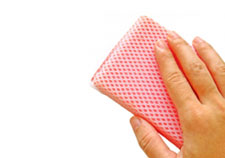Food Safety Tips for Your Home: It’s More Than “Don’t Wash Your Chicken”
October 1, 2013
 In investigating the food safety challenges that Philadelphia area residents experience in their kitchens, Jennifer Quinlan, PhD, an associate professor in the Nutrition Sciences Department decided it was best to actually get inside some of these kitchens. In a comprehensive study, she and two student research assistants are auditing kitchens and looking for food safety risks in Philadelphia homes.
In investigating the food safety challenges that Philadelphia area residents experience in their kitchens, Jennifer Quinlan, PhD, an associate professor in the Nutrition Sciences Department decided it was best to actually get inside some of these kitchens. In a comprehensive study, she and two student research assistants are auditing kitchens and looking for food safety risks in Philadelphia homes.
Quinlan, along with PhD candidates Pat Borrusso and Shauna Henley, are visiting 100 consumers’ homes, focusing on low-income and culturally-diverse populations. While one member of the research team administers a survey to the resident, their counterpart silently conducts an audit of the home. Does the resident have a cutting board? No hot water? Is their refrigerator temperature too high? The researchers look for food safety risks without telling the resident; some of these risks have been found unique to low-income households. For instance, residents without cutting boards may be cutting directly on unclean countertops . The researchers also take samples from the home, including dish rags and swabs from the sink and refrigerator.
“We want to know the prevalence of bacteria in people’s homes,” Quinlan explained. At the end of the year, the research team will analyze the results from the 100 home sample. Between what they learn about food safety practices within the home, the risks present and the pathogens that they find in samples, the team will be able to better understand the food safety challenges that low-income urban residents face. This study, which is funded by a grant from the USDA, will fill a gap in the research currently available.
Quinlan recently worked with Drexel's University Communications Office to publicize the availability of a food safety education campaign warning of the risks associated with washing poultry and other meats before cooking. “Don’t Wash Your Chicken” received widespread national attention from the media; it was featured on NBC, NPR, Fox News, HLN, Slate, and in Prevention Magazine. The campaign was developed with New Mexico State University as part of a USDA funded project. This recommendation has been in the USDA’s dietary guidelines since at least 2005, though an alarming number of Americans continue to wash their chickens, splattering harmful bacteria on themselves, their kitchen tools and other foods.
Although not washing chicken is a very important food safety practice, Quinlan recommends a variety of additional steps that we can take to make our homes safer:
- Keep your refrigerators operating at 40 degrees Fahrenheit or lower.
- Especially when cooking meat products, use a thermometer to ensure a safe temperature was reached during cook time.
- Keep pests out of the kitchen.
- Throw sponges into the washing machine regularly to kill bacteria. Or, simply throw them damp into the microwave for one minute.
- Keep pets and their food out of the kitchen.
- Anyone over age 65 should reheat lunch meat before eating it due to the listeria risk.
- Clean raw fruits and vegetables by running them under water.
- To clean a melon or another produce with thick, porous skin, run under water and scrub with a produce brush.
- Don’t wash bagged salad unless the label specifically instructs you to do so.
10. And last but not least…don’t wash your chicken! Or pork, or beef.